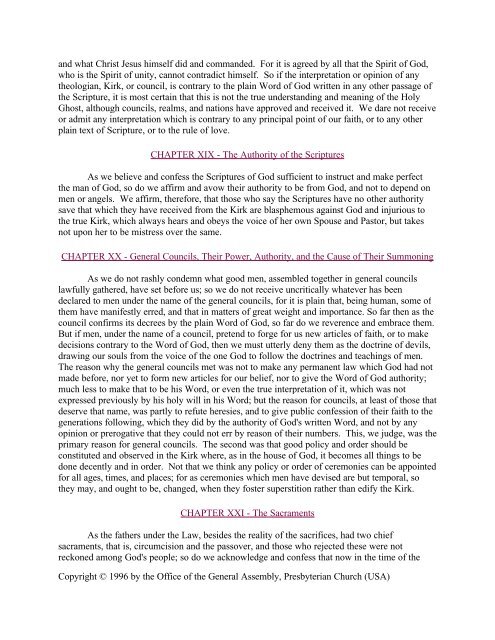The Book of Confessions - The Presbyterian Leader
The Book of Confessions - The Presbyterian Leader
The Book of Confessions - The Presbyterian Leader
Create successful ePaper yourself
Turn your PDF publications into a flip-book with our unique Google optimized e-Paper software.
and what Christ Jesus himself did and commanded. For it is agreed by all that the Spirit <strong>of</strong> God,<br />
who is the Spirit <strong>of</strong> unity, cannot contradict himself. So if the interpretation or opinion <strong>of</strong> any<br />
theologian, Kirk, or council, is contrary to the plain Word <strong>of</strong> God written in any other passage <strong>of</strong><br />
the Scripture, it is most certain that this is not the true understanding and meaning <strong>of</strong> the Holy<br />
Ghost, although councils, realms, and nations have approved and received it. We dare not receive<br />
or admit any interpretation which is contrary to any principal point <strong>of</strong> our faith, or to any other<br />
plain text <strong>of</strong> Scripture, or to the rule <strong>of</strong> love.<br />
CHAPTER XIX - <strong>The</strong> Authority <strong>of</strong> the Scriptures<br />
As we believe and confess the Scriptures <strong>of</strong> God sufficient to instruct and make perfect<br />
the man <strong>of</strong> God, so do we affirm and avow their authority to be from God, and not to depend on<br />
men or angels. We affirm, therefore, that those who say the Scriptures have no other authority<br />
save that which they have received from the Kirk are blasphemous against God and injurious to<br />
the true Kirk, which always hears and obeys the voice <strong>of</strong> her own Spouse and Pastor, but takes<br />
not upon her to be mistress over the same.<br />
CHAPTER XX - General Councils, <strong>The</strong>ir Power, Authority, and the Cause <strong>of</strong> <strong>The</strong>ir Summoning<br />
As we do not rashly condemn what good men, assembled together in general councils<br />
lawfully gathered, have set before us; so we do not receive uncritically whatever has been<br />
declared to men under the name <strong>of</strong> the general councils, for it is plain that, being human, some <strong>of</strong><br />
them have manifestly erred, and that in matters <strong>of</strong> great weight and importance. So far then as the<br />
council confirms its decrees by the plain Word <strong>of</strong> God, so far do we reverence and embrace them.<br />
But if men, under the name <strong>of</strong> a council, pretend to forge for us new articles <strong>of</strong> faith, or to make<br />
decisions contrary to the Word <strong>of</strong> God, then we must utterly deny them as the doctrine <strong>of</strong> devils,<br />
drawing our souls from the voice <strong>of</strong> the one God to follow the doctrines and teachings <strong>of</strong> men.<br />
<strong>The</strong> reason why the general councils met was not to make any permanent law which God had not<br />
made before, nor yet to form new articles for our belief, nor to give the Word <strong>of</strong> God authority;<br />
much less to make that to be his Word, or even the true interpretation <strong>of</strong> it, which was not<br />
expressed previously by his holy will in his Word; but the reason for councils, at least <strong>of</strong> those that<br />
deserve that name, was partly to refute heresies, and to give public confession <strong>of</strong> their faith to the<br />
generations following, which they did by the authority <strong>of</strong> God's written Word, and not by any<br />
opinion or prerogative that they could not err by reason <strong>of</strong> their numbers. This, we judge, was the<br />
primary reason for general councils. <strong>The</strong> second was that good policy and order should be<br />
constituted and observed in the Kirk where, as in the house <strong>of</strong> God, it becomes all things to be<br />
done decently and in order. Not that we think any policy or order <strong>of</strong> ceremonies can be appointed<br />
for all ages, times, and places; for as ceremonies which men have devised are but temporal, so<br />
they may, and ought to be, changed, when they foster superstition rather than edify the Kirk.<br />
CHAPTER XXI - <strong>The</strong> Sacraments<br />
As the fathers under the Law, besides the reality <strong>of</strong> the sacrifices, had two chief<br />
sacraments, that is, circumcision and the passover, and those who rejected these were not<br />
reckoned among God's people; so do we acknowledge and confess that now in the time <strong>of</strong> the<br />
Copyright © 1996 by the Office <strong>of</strong> the General Assembly, <strong>Presbyterian</strong> Church (USA)




